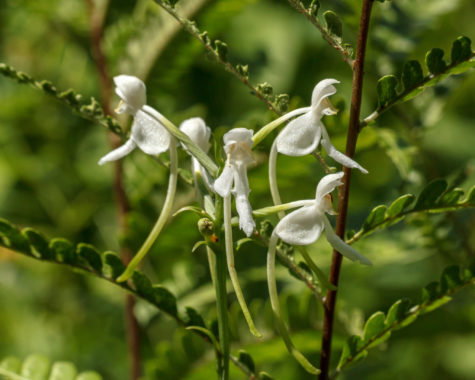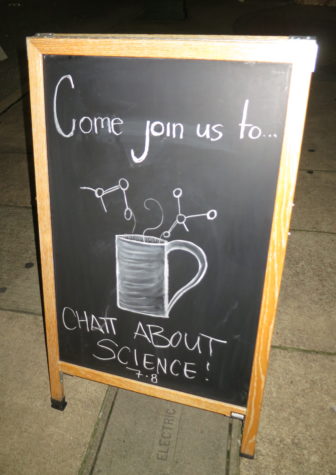 Almost exactly a year ago, as I drove across one of the bridges that span the Tennessee River near my home in Chattanooga, Tennessee, a bumper sticker “Proud of everything a liberal hates” flashed before me on the back of a white pickup truck. My stomach clenched. Even now, every time I think about that moment, the bile rises.
Almost exactly a year ago, as I drove across one of the bridges that span the Tennessee River near my home in Chattanooga, Tennessee, a bumper sticker “Proud of everything a liberal hates” flashed before me on the back of a white pickup truck. My stomach clenched. Even now, every time I think about that moment, the bile rises.
In Chattanooga, a purple island in a deep red state, I’m hardly surprised when my politics don’t align with those of my neighbors. But as a science writer during a time when both the scientific method and free speech are constantly, mercilessly, under attack, slogans like those on the back of the pickup truck aren’t just political but personal, and they can make me feel wildly alone.
But I’ve found a refuge from that loneliness: I started a science café. We met for the first time last November, the night after the presidential election.
Despite the timing of our first meeting, it wasn’t a partisan statement. My husband and I moved to Tennessee from Brooklyn five years ago. Our new city boasted some of the fastest internet in the Western Hemisphere, a burgeoning tech scene, a world-class aquarium, a slew of environmental non-profits, and a campus of the University of Tennessee. But there was no science café—nowhere that scientists and the scientifically curious could meet informally to talk about current research.
In mid-2016, as the cacophony of the presidential election reached its peak, I still couldn’t fathom that a major U.S. political party could nominate a candidate so out of touch with scientific reality. To me science, like civics, is a bipartisan issue, and fundamental to a functioning society. I looked at my husband and said, “It’s time to start the science café.” I didn’t know who, if anyone, would show up, but at the very least it would be volunteer project with a side benefit: I’d learn more about the science going on around me. Riffing on one of the common nicknames of my fair city, I called it “Chatt About Science.”
I started emailing and calling speakers. The first few were university professors. One had previously presented at a science café in Atlanta, but all were excited to interact with community members beyond their classrooms. At an early meeting, one participant tipped me off about a future speaker: a former high school teacher who ran a non-profit devoted to studying water quality both locally and in the Caribbean. I called local business owners, who graciously gave me permission to bring a new and unfamiliar group into their spaces. “Support Science, Support the Community” became my mantra as we moved toward our November launch.
On that first evening, as the election results were still settling in, twenty people showed up to hear about the white fringeless orchid, a native of the Southeast, and the characteristics that make species like this one rare, while other closely related ones pop up everywhere. Echoing my own thoughts, the speaker—a biology professor who studies plants as a way to understand environmental change—said, “I’m so glad I had this to look forward to today.”
 On the morning of our January meeting, the organizer of a local baby-boomer Meetup group emailed me to say that she was bringing 25 members to that evening’s discussion about human memory. Excited but a little panicked about space, I called our host café to find out how many people we could accommodate. It was standing room only that night, as participants peppered the speaker with questions about environmental cues and tricks for improving their memories.
On the morning of our January meeting, the organizer of a local baby-boomer Meetup group emailed me to say that she was bringing 25 members to that evening’s discussion about human memory. Excited but a little panicked about space, I called our host café to find out how many people we could accommodate. It was standing room only that night, as participants peppered the speaker with questions about environmental cues and tricks for improving their memories.
These discussions, unfolding just as our political system appeared to lose all reason, were about much more than orchid adaptation, human memory, urban ecology, and local water quality. They reaffirmed the importance of data, facts, and logic, and helped build a community of people that cared about them. They made me, and I hope everyone present, feel less besieged, less alone, and more hopeful.
Recently, when I spoke by phone with the restaurant owner who was hosting our next event about urban farming, he said, “Have you called to ‘Chatt about Science?’ I love that I get to say things like that.” He’s not the only one.
Sarah Webb is a science journalist and editor based in Chattanooga,Tennessee. Her work has appeared in Discover, Science News, Chemical & Engineering News, BioTechniques, and many other publications.
Photos: Tom Potterfield (CC BY-NC-SA 2.0), Sarah Webb
A Science Cafe sounds perfect! I wish there was one in my area.
How does one go about setting one up? Sounds like it would require that mystical something I keep hearing about called “people skills”. Wish I had those…
Well, gathering people does involve talking to people. And I generally like people, so that works for me.
Even though I spend a lot of my work life asking people to talk with me (for articles), this type of asking was different and a little intimidating at first. But when people said “yes”– and a lot of them did– it was super-rewarding.